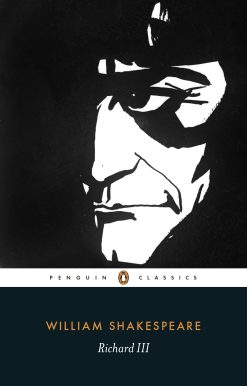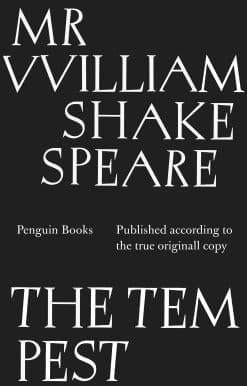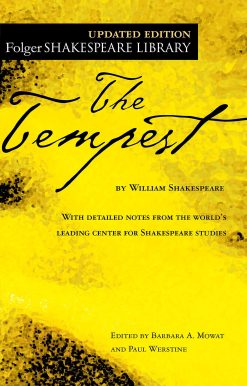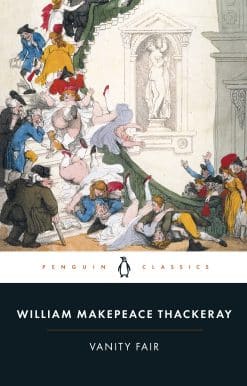The Duchess of Malfi: Seven Masterpieces of Jacobean Drama
19.00 JOD
Please allow 2 – 5 weeks for delivery of this item
Description
Edited and with an Introduction by Frank KermodeA Woman Killed with Kindness by Thomas HeywoodVolpone by Ben JonsonThe Revenger’s Tragedy by Cyril TourneurThe Maid’s Tragedy by John Fletcher and Francis BeaumontA Chaste Maid in Cheapside by Thomas MiddletonThe Duchess of Malfi by John WebsterThe Changeling by Thomas Middleton and William RowleyThe lyrical, bloodthirsty tragedies and witty urban comedies in this original collection were first performed during the reign of King James I (1603—25). Though nearly four centuries old, they display surprisingly modern sensibilities regarding sex, violence, morality, and honor. Brilliantly introduced and annotated by Frank Kermode, these seven Jacobean masterpieces are the finest and most representative plays of a time when drama was the most vital and important mirror of English society.
Additional information
| Weight | 2.91 kg |
|---|---|
| Dimensions | 3.94 × 13.31 × 2.32 cm |
| PubliCanadation City/Country | USA |
| by | |
| Format | Paperback |
| Language | |
| Pages | 688 |
| Publisher | |
| Year Published | 2005-5-10 |
| Imprint | |
| ISBN 10 | 0679642439 |
| About The Author | Frank Kermode is Britain’s most distinguished scholar of sixteenth- and seventeenth-century literature. He has written and edited numerous works, including Shakespeare’s Language and The Age of Shakespeare. He has taught at University College, London, and Cambridge University, and has been a visiting professor at Columbia, Harvard, and Yale, among other American institutions. He lives in Cambridge, England. |
| Excerpt From Book | A Woman Killedwith KindnessThomas HeywoodDRAMATIS PERSONAEMASTER FRANKFORDMISTRESS ANNE FRANKFORD, his wifeSIR FRANCIS ACTON, her brotherSIR CHARLES MOUNTFORDMASTER MALBYMASTER WENDOLL, befriended by FrankfordMASTER CRANWELL, an old gentlemanNICHOLASJENKINSPIGOT, ButlerCICELY MILKPAILOther serving-men and womenJACK SLIMEROGER BRICKBATJOAN MINIVERJANE TRUBKINISBELL MOTLEYMusiciansFALCONER and HuntsmenSUSAN, sister to Sir Charles MountfordSHERIFF, Officers, KEEPER, SHAFTONOLD MOUNTFORD, uncleSANDY, former friendRODER, former tenantTIDY, cousinServing-woman and ANNE's two little childrenCarters, CoachmanPROLOGUEI come but like a harbinger,1 being sentTo tell you what these preparations mean.Look for no glorious state; our Muse is bentUpon a barren subject, a bare scene.We could afford this twig a timber-tree,Whose strength might boldly on your favors build;Our russet, tissue; drone, a honey-bee;Our barren plot, a large and spacious field;Our coarse fare, banquets; our thin water, wine;Our brook, a sea; our bat's eyes, eagle's sight;Our poet's dull and earthly Muse, divine;Our ravens, doves; our crow's black feathers, white.But gentle thoughts, when they may give the foil,Save them that yield, and spare where they may spoil1. The officer who goes ahead of the court to arrange for its entertainment.A WOMAN KILLEDWITH KINDNESSACT I, SCENE IEnter Master John Frankford, Mistress Anne [Frankford,]Sir Francis Acton, Sir Charles Mountford, Master Malby,Master Wendoll, and Master CranwellSIR F. Some music, there! None lead the bride a dance?SIR C. Yes, would she dance The Shaking of the Sheets;But that's the dance her husband means to lead her.WEN. That's not the dance that every man must dance,According to the ballad.SIR F. Music, ho!By your leave, sister,-by your husband's leave,I should have said,-the hand that but this dayWas given you in the church I'll borrow.-Sound!This marriage music hoists me from the ground.FRANK. Ay, you may caper; you are light and free!Marriage hath yoked my heels; pray, then, pardon me.SIR F. I'll have you dance too, brother!SIR C. Master FrankfordY'are a happy man, sir, and much joySucceed your marriage mirth: you have a wifeSo qualified, and with such ornamentsBoth of the mind and body. First, her birthIs noble, and her education suchAs might become the daughter of a prince;Her own tongue speaks all tongues, and her own handCan teach all strings to speak in their best grace,From the shrill'st treble to the hoarsest bass.To end her many praises in one word,She's Beauty and Perfection's eldest daughter,Only found by yours, though many a heart hath sought her.FRANK. But that I know your virtues and chaste thoughts,I should be jealous of your praise, Sir Charles.CRAN. He speaks no more than you approve.MAL. Nor flatters he that gives to her her due.ANNE. I would your praise could find a fitter themeThan my imperfect beauties to speak on!Such as they be, if they my husband pleaseThey suffice me now I am married.This sweet content is like a flattering glass,To make my face seem fairer to mine eye;But the least wrinkle from his stormy browWill blast the roses in my cheeks that grow.SIR F. A perfect wife already, meek and patient!How strangely the word husband fits your mouth,Not married three hours since! Sister, 'tis good;You that begin betimes thus must needs provePliant and duteous in your husband's love.-Gramercies, brother! Wrought her to't already,-"Sweet husband," and a curtsey, the first day?Mark this, mark this, you that are bachelors,And never took the grace of honest man;Mark this, against1 you marry, this one phrase:In a good time that man both wins and woosThat takes his wife down in her wedding shoes.FRANK. Your sister takes not after you, Sir Francis:All his wild blood your father spent on you;He got her in his age, when he grew civil.All his mad tricks were to his land entailed,And you are heir to all; your sister, sheHath to her dower her mother's modesty.SIR C. Lord, sir, in what a happy state live you!This morning, which to many seems a burden,Too heavy to bear, is unto you a pleasure.This lady is no clog, as many are;She doth become you like a well-made suit,In which the tailor hath used all his art;Not like a thick coat of unseasoned frieze,1Forced on your back in summer. She's no chainTo tie your neck, and curb ye to the yoke;But she's a chain of gold to adorn your neck.You both adorn each other, and your hands,Methinks, are matches. There's equalityIn this fair combination; y'are bothScholars, both young, both being descended nobly.There's music in this sympathy; it carriesConsort and expectation of much joy,Which God bestow on you from this first dayUntil your dissolution,-that's for aye!SIR F. We keep you here too long, good brother Frankford.Into the hall; away! Go cheer your guests.What! Bride and bridegroom both withdrawn at once?If you be missed, the guests will doubt their welcome,And charge you with unkindness.FRANK. To prevent it,I'll leave you here, to see the dance within.ANNE. And so will I.Exeunt Frankford and Mistress FrankfordSIR F. To part you it were sin.-Now, gallants, while the town musiciansFinger their frets2 within, and the mad ladsAnd country lasses, every mother's child,With nosegays and bride-laces3 in their hats,Dance all their country measures, rounds and jigs,What shall we do? Hark! They're all on the hoigh;4They toil like mill-horses, and turn as round,-Marry, not on the toe! Ay, and they caper,Not without cutting; you shall see, to-morrow,The hall-floor pecked and dinted like a mill-stone,Made with their high shoes. Though their skill be small,Yet they tread heavy where their hobnails fall.SIR C. Well, leave them to their sports!-Sir Francis Acton,I'll make a match with you! Meet to-morrowAt Chevy Chase; I'll fly my hawk with yours.SIR F. For what? for what?SIR C. Why, for a hundred pound.SIR F. Pawn me some gold of that!SIR C. Here are ten angels;1I'll make them good a hundred pound to-morrowUpon my hawk's wing.SIR F. 'Tis a match; 'tis done.Another hundred pound upon your dogs;-Dare ye, Sir Charles?SIR C. I dare; were I sure to lose,I durst do more than that; here's my hand.The first course for a hundred pound!SIR F. A match.WEN. Ten angels on Sir Francis Acton's hawk;As much upon his dogs!CRAN. I am for Sir Charles Mountford: I have seenHis hawk and dog both tried. What! Clap ye hands,Or is't no bargain?WEN. Yes, and stake them down.Were they five hundred, they were all my own.SIR F. Be stirring early with the lark to-morrow;I'll rise into my saddle ere the sunRise from his bed.SIR C. If there you miss me, sayI am no gentleman! I'll hold my day.SIR F. It holds on all sides.-Come, to-night let's dance;Early to-morrow let's prepare to ride:We had need be three hours up before the bride.ExeuntSCENE IIEnter Nick and Jenkin, Jack Slime, Roger Brickbat, [Cicely,]with Country Wenches, and two or three MusiciansJEN. COME, NICK, TAKE YOU JOAN MINIVER, TO TRACE WITHAL, JACK SLIME, TRAVERSE YOU WITH CICELY MILKPAIL; I WILL TAKE JANE TRUBKIN, AND ROGER BRICKBAT SHALL HAVE ISBELL MOTLEY. AND NOW THAT THEY ARE BUSY IN THE PARLOR, COME, STRIKE UP; WE'LL HAVE A CRASH1 HERE IN THE YARD.NICK. MY HUMOR IS NOT COMPENDIOUS: DANCING I POSSESS NOT, THOUGH I CAN FOOT IT; YET, SINCE I AM FALLEN INTO THE HANDS OF CICELY MILKPAIL, I CONSENT.SLIME. TRULY, NICK, THOUGH WE WERE NEVER BROUGHT UP LIKE SERVING COURTIERS, YET WE HAVE BEEN BROUGHT UP WITH SERVING CREATURES,-AY, AND GOD'S CREATURES, TOO; FOR WE HAVE BEEN BROUGHT UP TO SERVE SHEEP, OXEN, HORSES, BOGS, AND SUCH LIKE; AND, THOUGH WE BE BUT COUNTRY FELLOWS, IT MAY BE IN THE WAY OF DANCING WE CAN DO THE HORSE-TRICK AS WELL AS THE SERVING-MEN.BRICK. Ay, and the cross-point2 too.JEN. O SLIME! O BRICKBAT! DO NOT YOU KNOW THAT COMPARISONS ARE ODIOUS? NOW WE ARE ODIOUS OURSELVES, TOO; THEREFORE THERE ARE NO COMPARISONS TO BE MADE BETWIXT US.NICK. I am sudden, and not superfluous;I am quarrelsome, and not seditious;I am peaceable, and not contentious;I am brief, and not compendious.SLIME. FOOT IT QUICKLY! IF THE MUSIC OVERCOME NOT MY MELANCHOLY, I SHALL QUARREL; AND IF THEY SUDDENLY DO NOT STRIKE UP, I SHALL PRESENTLY STRIKE THEE DOWN.JEN. NO QUARRELING, FOR GOD'S SAKE! TRULY, IF YOU DO, I SHALL SET A KNAVE BETWEEN YE.SLIME. I COME TO DANCE, NOT TO QUARREL. COME, WHAT SHALL IT BE? ROGERO?3JEN. Rogero? No; we will dance The Beginning of the World.CIC. I love no dance so well as John come kiss me now.NICK. I THAT HAVE ERE NOW DESERVED A CUSHION, CALL FOR THE CUSHION-DANCE.BRICK. For my part, I like nothing so well as Tom Tyler.JEN. No; we'll have The Hunting of the Fox.SLIME. The Hay, The Hay! There's nothing like The Hay.1NICK. I have said, do say, and will say again-JEN. Every man agree to have it as Nick says!ALL. Content.NICK. It hath been, it now is, and it shall be-CIC. What, Master Nicholas? What?NICK. Put on your Smock a' Monday.JEN. SO THE DANCE WILL COME CLEANLY OFF! COME, FOR GOD'S SAKE, AGREE OF SOMETHING: IF YOU LIKE NOT THAT, PUT IT TO THE MUSICIANS; OR LET ME SPEAK FOR ALL, AND WE'LL HAVE SELLENGER'S ROUND.ALL. That, that, that!NICK. NO, I AM RESOLVED THUS IT SHALL BE: FIRST TAKE HANDS, THEN TAKE YE TO YOUR HEELS!JEN. Why, would you have us run away?NICK. No; but I would have ye shake your heels.-Music, strike up![They dance; Nick dancing, speaks stately and scurvily,2the rest, after the country fashion]JEN. Hey! Lively, my lasses! Here's a turn for thee!ExeuntSCENE IIIWind horns. Enter Sir Charles [Mountford,] Sir Francis [Acton,] Malby, Cranwell, Wendoll, Falconer, and HuntsmenSIR C. So; well cast off! Aloft, aloft! Well flown!O, now she takes her at the souse,3 and strikes herDown to th' earth, like a swift thunder-clap.WEN. She hath struck ten angels out of my way.SIR F. A hundred pound from me.SIR C. What, falconer!FALC. At hand, sir!SIR C. Now she hath seized the fowl and 'gins to plume her,1Rebeck2 her not; rather stand still and check her!So, seize her gets,3 her jesses,4 and her bells! Away!SIR F. My hawk killed, too.SIR C. Ay, but 'twas at the querreNot at the mount, like mine.SIR F. Judgment, my masters!CRAN. Yours missed her at the ferre.5WEN. Ay, but our merlin first had plumed the fowl,And twice renewed6 her from the river too.Her bells, Sir Francis, had not both one weight,Nor was one semi-tune above the other.Methinks, these Milan bells do sound too full,And spoil the mounting of your hawk.SIR C. 'Tis lost.SIR F. I grant it not. Mine likewise seized a fowlWithin her talons, and you saw her pawsFull of the feathers; both her petty singles7And her long singles griped her more than other;The terrials8 of her legs were stained with blood,Not of the fowl only, she did discomfitSome of her feathers; but she brake away.Come, come; your hawk is but a rifler.9SIR C. How!SIR F. Ay, and your dogs are trindle-tails10 and curs.SIR C. You stir my blood.You keep not one good hound in all your kennel,Nor one good hawk upon your perch.SIR F. How, knight!SIR C. So, knight. You will not swagger, sir?SIR F. Why, say I did?SIR C. Why, sir,I say you would gain as much by swaggeringAs you have got by wagers on your dogs.You will come short in all things.SIR F. Not in this!Now I'll strike home.[Strikes Sir Charles]SIR C. Thou shalt to thy long home,Or I will want my will.SIR F. All they that love Sir Francis, follow me!SIR C. All that affect Sir Charles, draw on my part!CRAN. On this side heaves my hand.WEN. Here goes my heart.[They divide themselves. Sir Charles Mountford, Cranwell,Falconer, and Huntsman, fight against Sir Francis Acton,Wendoll, his Falconer and Huntsman; and Sir Charles hath thebetter, and beats them away, killing both of Sir Francis's men.]Exeunt all but Sir Charles MountfordSIR C. My God, what have I done? What have I done?My rage hath plunged me into a sea of blood,In which my soul lies drowned. Poor innocents,For whom we are to answer! Well, 'tis done,And I remain the victor. A great conquest,When I would give this right hand, nay, this head,To breathe in them new life whom I have slain!-Forgive me, God! 'Twas in the heat of blood,And anger quite removes me from myself.It was not I, but rage, did this vile murder;Yet I, and not my rage, must answer it.Sir Francis Acton, he is fled the field;With him all those that did partake his quarrel;And I am left alone with sorrow dumb,And in my height of conquest overcome.Enter SusanSUSAN. O God! My brother wounded 'mong the dead!Unhappy jests, that in such earnest ends!The rumor of this fear stretched to my ears,And I am come to know if you be wounded.SIR C. O, sister, sister! Wounded at the heart.SUSAN. My God forbid!SIR C. In doing that thing which he forbad.I am wounded, sister.SUSAN. I hope, not at the heart.SIR C. Yes, at the heart.SUSAN. O God! A surgeon, there.SIR C. Call me a surgeon, sister, for my soul!The sin of murder, it hath pierced my heartAnd made a wide wound there; but for these scratches,They are nothing, nothing.SUSAN. Charles, what have you done?Sir Francis hath great friends, and will pursue youUnto the utmost danger1 of the law.SIR C. My conscience hath become mine enemy,And will pursue me more than Acton can.SUSAN. O! Fly, sweet brother!SIR C. Shall I fly from thee?Why, Sue, art weary of my company? |
Only logged in customers who have purchased this product may leave a review.






Reviews
There are no reviews yet.